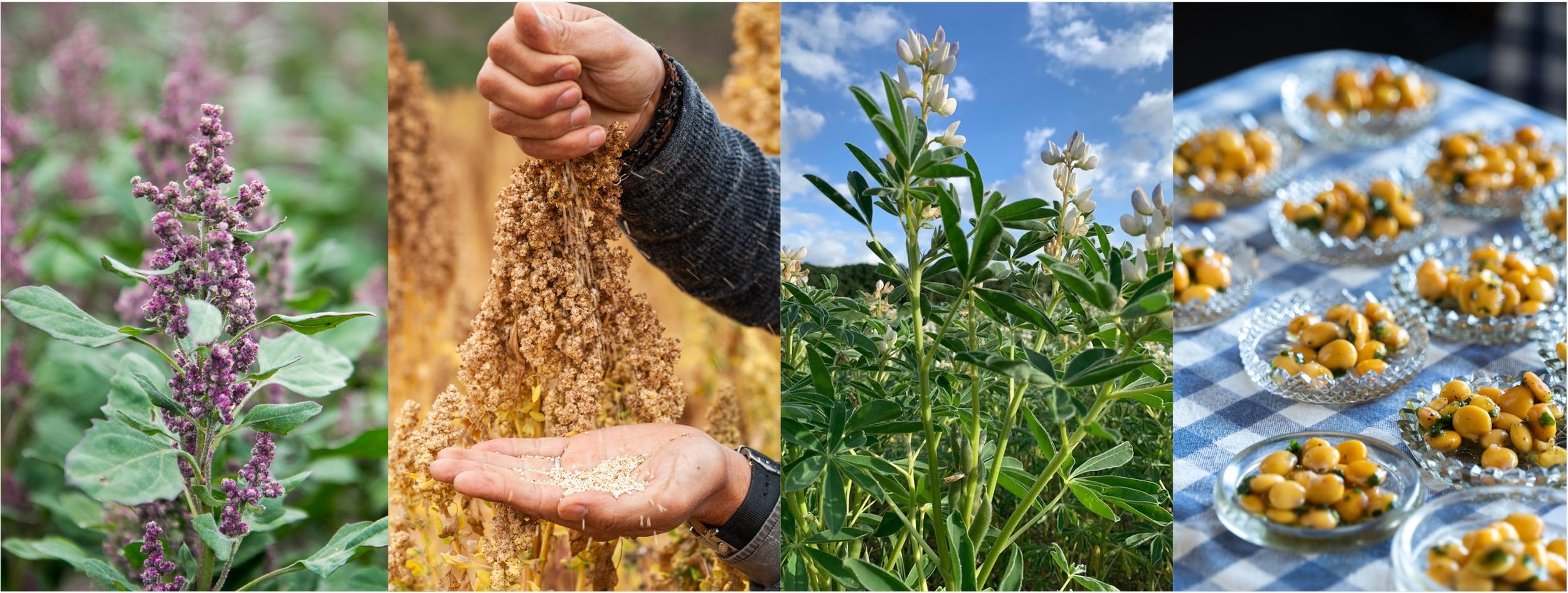2 Million EUR to accelerate quinoa and lupin breeding
A healthier planet needs greater diversity in farms and diets: quinoa and white lupin can strengthen our food production systems. Strategic funding to propel quinoa and white lupin through modern breeding technologies.
Radicle Crops has allied with Wageningen Plant Research, Plantik Biosciences, and Lekker Lupine on a new project aiming to accelerate quinoa and white lupin breeding. The project (worth ~2 million euros) is co-funded by the Dutch government via its Top Sector Knowledge and Innovation (TKI) subsidy program (https://topsectortu.nl/en/). The three companies aim to bring more biodiversity to farmers and diets worldwide. Wageningen Plant Research is a leading academic and research institute in plant biotechnology and plant breeding.
Quinoa and white lupin: two extraordinary crops for future food production systems
Global diets rely on a surprisingly small number of crop species. By consuming and farming the same crops, again and again, we have weakened the resilience of our food production system. Farmers worldwide are rediscovering alternative crops that are more nutritious, hardier in the face of climate change, and kinder to the environment.
Quinoa and white lupin are two unique crop species that can contribute to more diverse diets and a healthier planet. Quinoa is tolerant to drought and salinity and can effectively produce food in marginal farmland where common staples cannot thrive. White lupins are avid nitrogen fixers that could prove invaluable in regenerative agriculture programs. Both species are gluten-free and protein-rich (quinoa is also one of few plant-based sources of “complete proteins”). They are ideal ingredients for a plant-based future!
As the impacts of climate change become starker, alternative crops like quinoa (left panels) and white lupin (right panels) offer hope for greater agricultural resiliency and more nutritious diets. Modern breeding technologies are the key to unlocking the potential of alternative crop species.
The project in a nutshell
Farmers, food makers, and consumers worldwide are growing fonder of quinoa and white lupin. However, the two species have been largely neglected by breeding programs. Their wide-scale adoption requires significant crop improvement efforts to address key limitations – like the presence of anti-nutrients in lupin seeds or the susceptibility of quinoa to heat stress. The private-public consortium will speed up the introduction of new breeding technologies and the creation of new genetic variation in both species to address key breeding objectives. Specifically:
In quinoa, mutant populations will be created through chemical mutagenesis and CRISPR gene editing tools. These populations will be used in forward and reverse genetic screens. The goal is to identify genes that amplify exceptional traits (i.e., high productivity under drought) or convey novel characteristics (e.g., tolerance to herbicides and heat stress).
In white lupin, classical mapping strategies and mutant populations will be used to rapidly eliminate the presence of anti-nutritional alkaloids in seeds, as well as to develop new sources of resistance to anthracnose. This disease dramatically reduces the yields of white lupin farmers.
The project will not only deliver new (breeding) materials with improved traits for both species. It will also lead to the creation of modern bioinformatic and gene-editing tools for discovering useful traits desired by the farming and food industry.
Want to know more? Get in touch with us!
Would you like to know more about the project? Are you interested in learning more about quinoa, white lupin, or modern breeding technologies for emerging crops? Feel free to contact us:
– Dr. Andrés Torres Salvador
andres at radiclecrops.com
– Dr. Robert van Loo
robert.vanloo at wur.nl
– Ms. Ying Shao
ying at plantik.bio
– Ms. Marieke Laméris
info at lekkerlupine.nl



